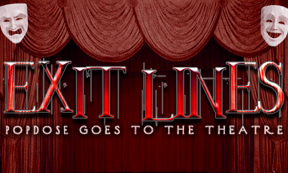 Young Jean Lee’s Straight White Men is the first play by an Asian-American woman to be produced on Broadway. The good news is, better ones are likely to follow in its wake, perhaps even by Lee. She’s had a commendable career Off Broadway, where Straight White Men originated, in a Public Theater production four years ago. That was of course before the Trump era, and this play, an examination of privilege, hasn’t kept up with fast-changing times. Even with rewriting, there’s an Obama skittishness about it.
Young Jean Lee’s Straight White Men is the first play by an Asian-American woman to be produced on Broadway. The good news is, better ones are likely to follow in its wake, perhaps even by Lee. She’s had a commendable career Off Broadway, where Straight White Men originated, in a Public Theater production four years ago. That was of course before the Trump era, and this play, an examination of privilege, hasn’t kept up with fast-changing times. Even with rewriting, there’s an Obama skittishness about it.
Before the show begins the tiny Hayes theater is engulfed in pounding hip hop music. Apparently the din (from music that its characters have assimilated as their own) is meant to discomfit stuffy Broadway viewers, but already the play had backfired on the Friday I attended; everyone seemed to be pumped up, ready to put itself (a largely white audience, if not all straight or all men) under the knife. Two trans performers, identified as Person in Charge I (Kate Bornstein) and Person in Charge 2 (Ty Defoe) appear, to crack wise and set the stage for the examination. The curtain comes up on Todd Rosenthal’s set, which puts a literal frame around a benignly unkempt, mannish living room in the Midwest, bereft of a woman’s touch. “Let the procedure begin,” all this throat-clearing seems to announce.
But the dissection doesn’t cut terribly deep. Drew (Armie Hammer, in his Broadway debut) and Jake (Josh Charles) return to their family home to bring Christmas cheer to their recently widowed dad, Ed (Stephen Payne). That never works in drama, and sure enough Yuletide blessings begin to curdle. The main bone of contention is their older brother Matt (Paul Schneider), who showed such promise early on, but now seems to languish, taking care of Ed and working odd jobs. His younger brothers are affronted by his lack of ambition, and push comes literally to shove as they suggest therapy and other possible cures. The middle-age-ish boys, whose staunchly liberal mother raised them on a guilt-inducing board game called “Privilege,” turn on each other, to Ed’s befuddlement.
That non-existent board game is one of the odd touches that Lee dabs onto an otherwise familiar canvas. The Persons in Charge reorient the furniture at the one-act play’s midpoint but are otherwise never seen again; is this a comment on their being “outside the narrative” of straight white men, but somehow influencing it? It’s hard to see how–Jake, who’s divorcing, refers to his black wife and their children, and Matt worked with the poor in Ghana, but class, not race, is the predominant issue. (Well, there is an impromptu “Ku Klux Klan” rendition of “Oklahoma!”, a musical mom wrote off as racist.) Abetted by the pacy direction of Anna D. Shapiro, Lee is good at generating a certain amount of tension as the characters tiptoe around their troubles, but less good at making sense of the emotional detonations when they arrive, or “saying something” about the loose threads she’s intentionally added.
An advantage of seeing a show later in its run is that the cast can coalesce into an crackling ensemble, and Hammer and Charles have the combative brother dynamic down to a T, crashing into each other at regular intervals. (Following his moves in Call Me By Your Name Hammer gets down here as well, suggesting an offbeat dance musical in his future.) Payne, a professional understudy who got the role when the originally cast Tom Skerritt dropped out, plumbs the melancholy of a peace-keeping patriarch. But all eyes tend to fall on Schneider, whose Matt keeps pushing away the knife his family subjects him to. What Straight White Men does have is outstanding straight white men.





Comments